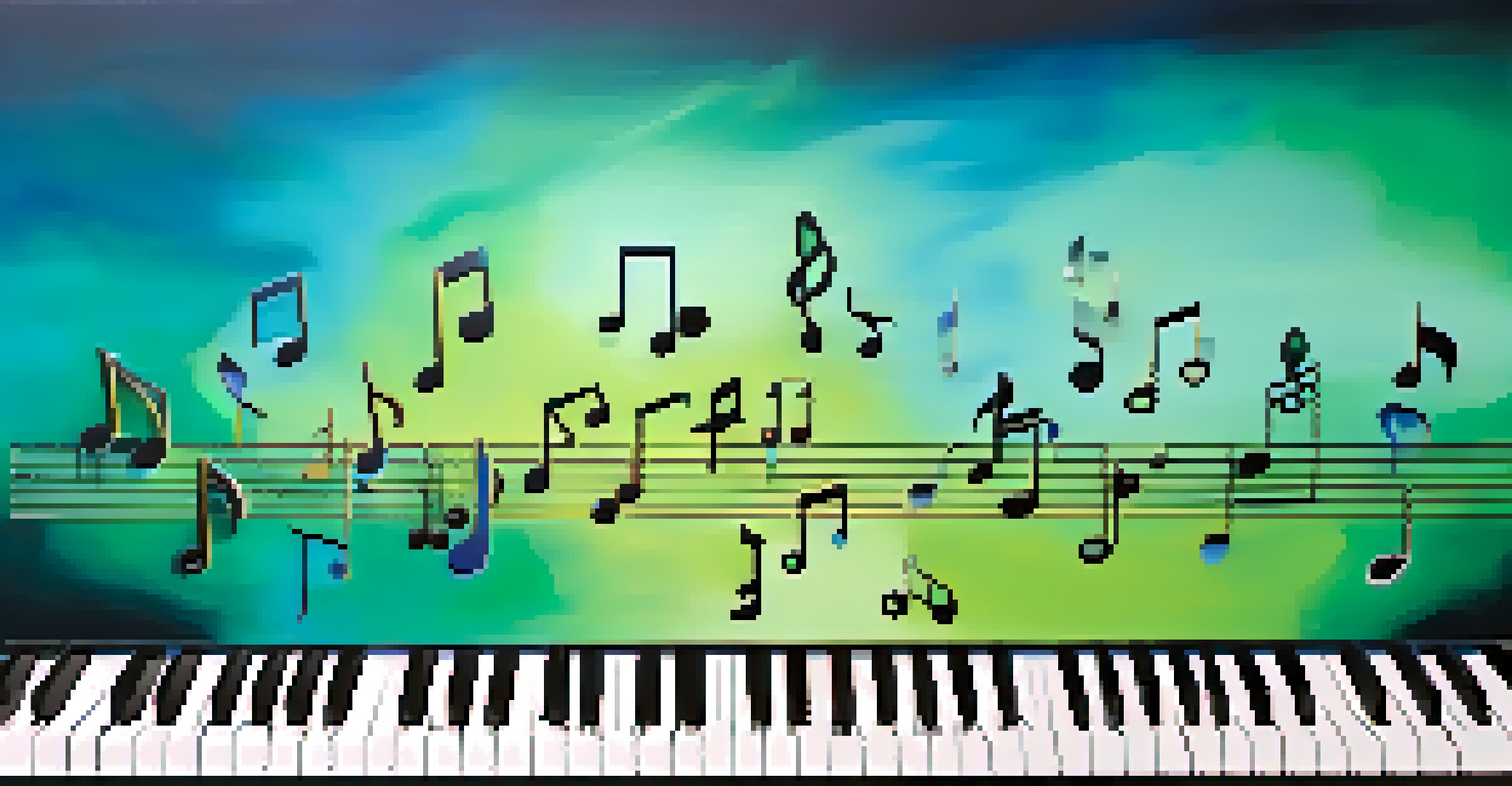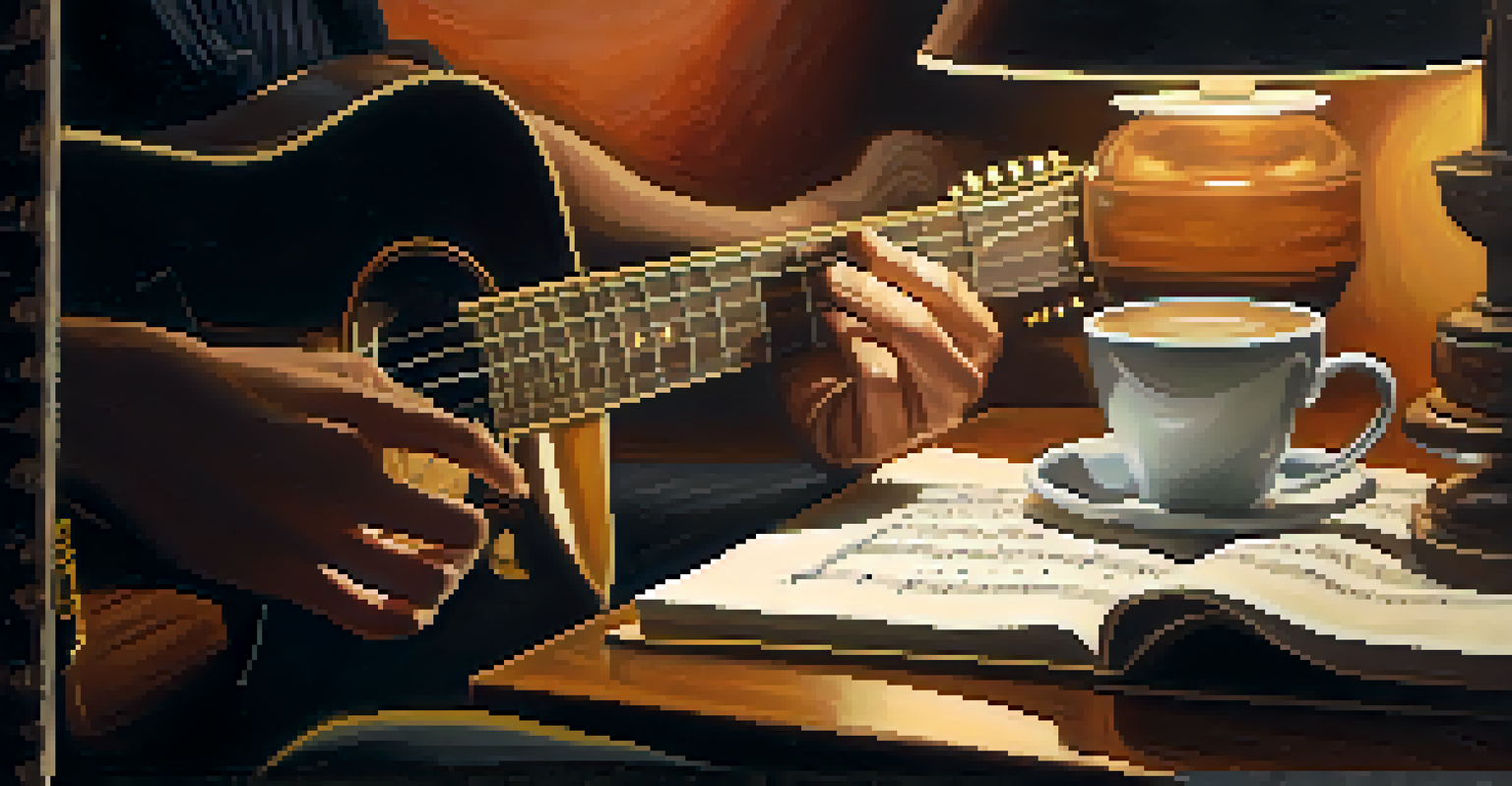Understanding Music Licensing: Essential Knowledge for Musicians

What Is Music Licensing and Why Does It Matter?
Music licensing is the legal permission to use music in various contexts, such as films, advertisements, or digital platforms. Without proper licensing, using someone else's music can lead to legal issues and financial penalties. For musicians, understanding this concept is essential to protect their creative work and ensure they are compensated fairly.
Music is the shorthand of emotion.
Imagine if someone took your artwork and sold it without your permission; you'd want to be compensated, right? Similarly, music creators deserve recognition and payment for their work. Licensing helps establish this framework, allowing artists to monetize their creations while providing users the right to use them legally.
In essence, music licensing serves as a bridge between creators and users, ensuring that both parties understand their rights and obligations. This understanding is crucial for musicians who want to thrive in an industry that increasingly values originality and legality.
Different Types of Music Licenses Explained
There are several types of music licenses, each serving a unique purpose. The most common types include synchronization licenses for film and TV, mechanical licenses for physical copies, and performance licenses for public performances. Each license allows specific uses and has its own rules regarding payment and rights.

For instance, if you want to use a song in a movie, you'd need a synchronization license. This license gives you the right to sync the music with visual content, making it essential for filmmakers. On the other hand, if you're a musician looking to distribute your music on streaming platforms, a mechanical license will be required to ensure you're compensated for each stream or download.
Music Licensing Protects Creators
Understanding music licensing is vital for musicians to protect their work and ensure fair compensation.
Understanding these licenses will help you navigate the music industry more effectively. By knowing which license you need for your project, you can avoid potential legal issues and ensure that your work is protected.
How to Obtain Music Licenses for Your Work
Obtaining music licenses can seem daunting, but breaking it down into steps makes it manageable. First, identify the type of license you need based on how you plan to use the music. Next, research the rights holders—these could be the artists, record labels, or publishers who own the music.
Without music, life would be a mistake.
Once you know who to contact, reach out to negotiate the terms of the license. This may involve discussing fees, duration, and how the music will be used. Keep in mind that some rights holders may also have standard licensing agreements that can simplify the process.
Lastly, always make sure to get the agreement in writing. This protects both parties and ensures clarity on what has been agreed upon. By following these steps, you can secure the necessary licenses and focus on what you do best—creating great music.
The Role of Performance Rights Organizations (PROs)
Performance Rights Organizations (PROs) play a crucial role in the music licensing landscape. They act as intermediaries between musicians and those who want to use their music, such as radio stations, venues, or streaming services. By joining a PRO, musicians can ensure they receive royalties whenever their music is performed publicly.
Imagine a restaurant playing your song in the background; you deserve to get paid for that! PROs track these performances and distribute royalties to their members. This way, musicians can focus on their craft while the PRO handles the business side, ensuring they are compensated for their work.
Types of Licenses Are Essential
Different types of music licenses, such as synchronization and performance licenses, serve unique purposes in the industry.
Common PROs include ASCAP, BMI, and SESAC, each with its own membership fees and benefits. Joining a PRO is a wise step for any musician looking to protect their rights and earn money from performances.
Understanding Copyright and Its Importance in Music
Copyright is a legal framework that protects original works, including music. When you create a song, you automatically hold the copyright, giving you exclusive rights to reproduce, distribute, and perform it. This protection is vital for musicians, as it prevents others from using your work without permission.
Think of copyright as a shield for your creativity. It allows you to control how your music is used and ensures you receive compensation. Without copyright, anyone could take your song and use it in their projects, leaving you without recognition or income.
It's essential to register your copyright to enhance your legal protection. While your work is automatically protected, registering it with the copyright office provides a public record, making it easier to enforce your rights if someone infringes upon them.
The Impact of Digital Platforms on Music Licensing
Digital platforms have revolutionized the music industry, creating new opportunities and challenges for licensing. As streaming services like Spotify and Apple Music gain popularity, musicians must navigate the complexities of digital licensing to ensure they are compensated fairly. This shift has made understanding music licensing more crucial than ever.
On one hand, digital platforms offer musicians unprecedented access to audiences worldwide. On the other hand, the licensing agreements can be intricate, often resulting in lower payouts per stream compared to traditional sales. This dynamic highlights the importance of knowing your rights and the terms of the agreements you enter into.
Digital Platforms Change Licensing
The rise of digital platforms has created new challenges and opportunities in music licensing, making it crucial for artists to stay informed.
As an artist in the digital age, it's vital to stay informed about how these platforms operate. By understanding the licensing landscape, you can make informed decisions that benefit both your career and your financial well-being.
Common Mistakes Musicians Make with Licensing
Even experienced musicians can stumble when it comes to licensing. One common mistake is assuming that all uses of music require a license, which can lead to unnecessary fees. In some cases, fair use may apply, allowing limited use without a license, but it's essential to understand the nuances of this legal concept.
Another pitfall is not thoroughly researching rights holders before using music. Failing to obtain the proper license can result in legal trouble down the line, undermining your creative efforts. Always take the time to verify who owns the rights to a song before incorporating it into your work.

Lastly, many musicians overlook the importance of keeping records of their licensing agreements. Having clear documentation can protect you in disputes and ensure you receive the royalties you deserve. By avoiding these common mistakes, you can navigate the music licensing landscape more effectively.
Future Trends in Music Licensing for Artists
As the music industry continues to evolve, so too does the landscape of music licensing. Recent trends show an increase in the use of blockchain technology to streamline licensing processes and enhance transparency. This innovation has the potential to revolutionize how artists and rights holders interact, ensuring fair compensation.
Moreover, as more creators turn to platforms like TikTok and YouTube for exposure, the demand for user-friendly licensing agreements is growing. Artists are beginning to seek out simpler, more accessible licensing options that allow them to share their music while protecting their rights. This shift is paving the way for a more inclusive and artist-friendly licensing environment.
In conclusion, staying informed about these trends can help musicians adapt and thrive in an ever-changing industry. By understanding the future of music licensing, you can better position yourself for success and ensure your work is respected and valued.